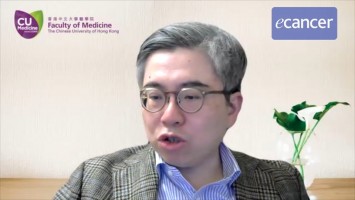IMbrave050 is a phase III trial of adjuvant atezolizumab plus bevacizumab versus active surveillance in patients with high risk of recurrence following surgical resection or ablation. As you know, currently there is no proven adjuvant therapy for patients who have just undergone resection or ablation in HCC and because of that the recurrence rates after resection are very high. What this study aims to do is to see whether the therapies atezolizumab and bevacizumab used together can reduce recurrence and improve the recurrence-free survival of the patients.
The IMbrave050 enrols patients at high risk of recurrence and these are patients with large tumours, with multiple tumours, with vascular invasion or with poor differentiation on the pathology. The trial at its first interim analysis met its primary endpoint of recurrence-free survival with a hazard ratio of 0.72 and a p-value of 0.012. A landmark analysis at twelve months in the trial shows that patients with atezolizumab and bevacizumab have a recurrence-free survival of 78% versus 65% of patients on active surveillance. An independent review facility also showed that recurrence rates were very different - recurrence rates were 34% of patients on active surveillance versus 20% for patients on atezolizumab plus bevacizumab.
Patients are quite balanced between the two arms of the trial. When we look at the subset analysis it is quite interesting to note that the recurrence-free survival benefit seems to apply equally to all the major clinical subsets. This is specifically so for both patients with viral hepatitis HCC and for those patients with non-viral hepatitis HCC, both of which seem to benefit from atezolizumab and bevacizumab. This recurrence-free survival seems to be particularly enhanced in patients with larger tumours and patients with more numbers of tumours.
The duration of treatment for patients on the 050 was 11.1 months for atezolizumab and 11 months for bevacizumab. This was significantly longer than what we saw for the previous IMbrave150 using the same drugs. But, in spite of this longer duration of treatment, we do not see an increase in AEs.
The AEs which were significant or which were seen in more than 10% of patients were higher in the group of patients with atezolizumab plus bevacizumab. The important ones were the AE of proteinuria, the AE of hypertension, the AE of increased biliary count and also derangements in liver function.
So, in summary, this is historically the first positive phase III trial of adjuvant therapy in patients with HCC following surgical resection or ablation. There is a significant improvement in recurrence-free survival in this trial. The overall survival data was still immature at the time of this first interim analysis and we will require a longer follow-up time. Adverse events that we see are what we expect to see with these drugs and with the disease indication. Atezolizumab and bevacizumab will very likely be a standard of care for patients with surgical resection or ablation as adjuvant therapy and may change clinical indications for surgical resection in this group of patients.
How might these results impact the future treatment of hepatocellular carcinoma?
Given the fact that there was no previously proven adjuvant therapy in HCC, this constitutes a very important unmet clinical need for patients with primary liver cancer. Essentially, previous to this if you had liver cancer and you have undergone liver resection or ablation there was no therapy that could be used that can prevent recurrence or delay recurrence. So this trial provides the first effective therapy in this indication. Because of that there is every expectation that this will impact on clinical management in the future.








